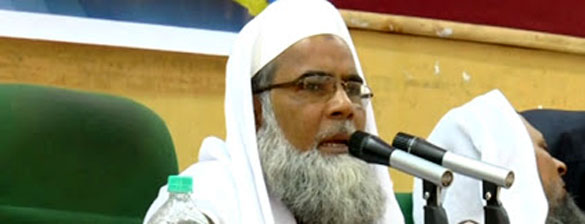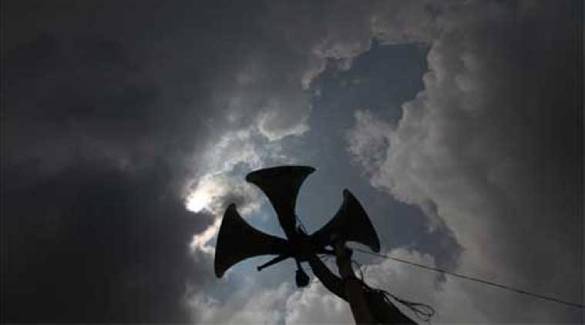Limit use of loudspeakers for Azan, says Maulana Rahmani, invites Muslim anger
Muslims Club Maulana Khalid Saifullah Rahmani
With Singer Sonu Nigam Over Limited Use Of Azan On Loudspeakers
Highlights:
1. Maulana Khalid Saifullah Rahmani advocated
limited use of loudspeakers for azan
2. He said loudspeakers can be used by only one
mosque in an area and the rest of the mosques should call the azan without loudspeakers
3. Muslims denounced Maulana Rahmani for the
advice
4. Some people called for his boycott
5.Maulana Rahmani had to retract his statement
-----
By New Age Islam Staff Writer
21 April 2021

Maulana Khalid Saifullah Rahmani
-------
In the 15th
April issue of Urdu daily Rashtriya Sahara, Zafar Darik Qasmi laments the
narrow-minded approach of common Muslims on important social and communal
issues. In this regard he gives an account of a controversy involving the use
of loudspeakers by Muslims for calling the Azan. It is known to all that during
the last a decade or two, opposition to use of mike for calling the five times
azan has grown. This opposition to the use of mike was first demonstrated by
Bal Thackeray in the 90s by saying that he could not tolerate the azan on mike
even for three seconds. During that period, Muslims had started installing
mikes in mosques for calling the azan. Before that, till the 70s or 80s, most
of the mosques, especially in rural or semi urban areas mosques did not use
mike and muezzins used to call the azan from the azangah or a mounted place.
Loudspeakers
were used only in big cities. But by the 90s, the use of mike grew and it
became an essential part of every mosque in urban and rural areas. In the later
period, the loudspeakers assumed such an important place in the religious
activities of Muslims, that even the five times prayers were conducted on
loudspeakers though the number of regular devotees participating in five time
prayers was very low. In the dawn prayers, the number of Namazis was even below
ten. But the mike was used to call the azan. In some mosques, three or four
loudspeakers are tied to one minaret.
As the
religious intolerance grew in India, this use of loudspeakers was increasingly
opposed by non-Muslims on the basis that the azan on loudspeakers disturbed
their peace of mind or sleep. The Bollywood singer Sonu Nigam invited the ire
of Muslims for voicing his feeling that azan on loudspeaker at dawn disturbed
his sleep. It is to be noted, that Mumbai is known for its night life and most
of the people go to bed in the later part of night. So the azan on loudspeaker
disturbs their sleep when they are in the midst of a sound sleep.
Last
Ramadan, in many villages and towns, non-Muslims opposed azan on loudspeakers
in mixed population and in some places, the opposition turned violent. In some
places the local administration also banned azan on loudspeakers.
Keeping in
view the growing opposition to azan on loudspeakers, Muslim intellectuals and
even some Ulema advocated limited use of loudspeakers for azan to avoid
confrontation.
One of the
Ulema who advised Muslims to use loudspeakers for azan in a limited way is
Maulana Khalid Saifullah Rahmani. Zafar Darik Qasmi in his article published in
Rashtriya Sahara wrote that Maulana Khalid Saifullah Rahmani recently appealed
to Muslims to reduce the use of loudspeakers for azan. He put forward the
suggestion that if in a Muslim locality, there are more than one mosques, the
azan should be called on loudspeakers only from one mosque and azan should be
called without loudspeakers from the rest of the mosques. This suggestion was
not bad, rather prudent. But unfortunately, the advice caused adverse reactions
from the Muslim community and some of the so-called intellectuals even called
for a social boycott of Maulana Khalid Saifullah Rahmani. According to the
writer, his statement was condemned by a section of Muslims and as a result,
Maulana Rahmani withdrew his statement.

This speaks
of the obsession of Muslims with the loudspeaker. Now the loudspeaker has
become so important to them that opposition to the use of mike is construed as
opposing Islam though loudspeaker is not mandated for Islamic religious events.
Use of loudspeakers for calling the azan is only a late 20th century phenomenon
in India. Before that, loudspeakers were not used for azan or for Milad in
small localities. Loudspeakers were used only for big congregations or
meetings. That a religious figure like Maulana Khalid Saifullah Rahmani is
denounced for advising against the use of loudspeakers for azan to the extent
that he has to withdraw his statement is not in the good interests of the
community. The Muslim community now does not even listens to its Ulema and
perhaps has got the belief that whoever advises not to use loudspeakers for
azan is an enemy of Islam. On this count Maulana Khalid Saifullah Rahmani and
singer Sonu Nigam are put on the same pedestal. Its very dangerous.
Not only
loudspeakers are considered important for azan but also for other social events
like marriages or festivals. Nowadays DJs are used for playing cassettes of
Naat or filmi songs on the occasion of Eid Milad-un-Nabi or on weddings.
Residents cannot oppose the playing of Naat on high decibel sound boxes for
fear of being branded enemy of Islam or oppose playing filmi songs for fear of
being accused of spoiling the festive mood. No one cares for the inconveniences
caused to the Muslims and non-Muslims of the area by high decibel sound of DJs
the whole day.
It is time
Muslim scholars, intellectuals and clergy sat to deliberate on the issue of use
of loudspeakers for social and religious purposes and chalk out a collective
policy on the use of loudspeakers keeping in view the problems the use of
loudspeakers causes to the other communities and to the Muslim community
itself. Loudspeakers are not an integral part of Islam and so its use can be
regulated in a multi-religious society. The use of loudspeakers should not
violate the rights of neighbours enshrined in the Quran.
URL: https://newageislam.com/islam-politics/limit-use-loudspeakers-azan,-says/d/124719
New Age Islam, Islam Online, Islamic
Website, African Muslim News, Arab World News, South Asia News, Indian Muslim News, World Muslim News, Women in Islam, Islamic Feminism, Arab Women, Women In Arab, Islamophobia in America, Muslim Women in West, Islam Women and Feminism
